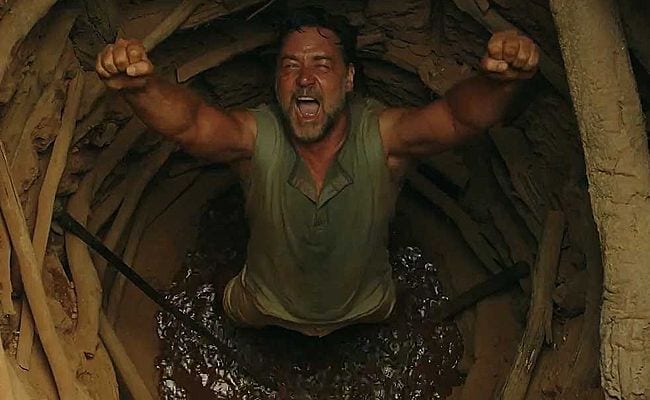
Apparently, there is a prerequisite to making your first feature film. As an actor stepping behind the lens for your initial attempt at directing, you are clearly mandated to make a movie about the past, usually a historical epic, one with lots of scope, sweeping vistas, and big socio-political talking points. Mel Gibson did it with Braveheart. He walked away with an Oscar. Kevin Costner did it with Dances with Wolves. He, too, won an Academy Award.
Now Russell Crowe steps up to discuss Australia’s early 20th century struggles on the Turkish peninsula of Gallipoli. Sadly, it looks like the Academy won’t be recognizing The Water Diviner anytime soon. The Razzies, on the other hand? Maybe.
Indeed, for his debut as a Oz auteur, the popular performer has taken a book by Andrew Anastasios of the same title (also a co-screenwriter here) and Dr. Meaghan Wilson-Anastasios and turned it into two hours of mush. The story of a simple farmer who travels to the former war zone to collect the corpses of his (supposedly) dead sons reeks of noble intentions and failed ambitions. From the opening sequence, which suggests an H2O-based There Will Be Blood to a cobbled together interracial romance, there is nothing new or noteworthy on display. In fact, Crowe’s perspective is so generic that this could be any battlefield, any war-torn region. We only know it’s Gallipoli because we are told it is over and over again.
As Joshua Connor, a man known for his divining (water finding) ability, Crowe spends most of the movie looking morose — and why not? After his boys went off to war, they were declared dead, and their blood-stained belongings sent home. This drives Mrs. Connor to suicide, leaving Joshua with nothing. Deciding to bring the bodies of his children back for a proper Christian burial, he travels to Turkey, runs into a bunch of British red tape, and ends up at the comfortable inn of widow Ayshe (Olga Kurylenko) and her precocious son Orhan (Dylan Georgiades). She tells Joshua how to sneak onto the off limits area. He does, and instantly comes under the scrutiny of supervising officer Lt-Col Cyril Hughes (Jai Courtney).
His job has been to use a pair of captured Turkish officers — Major Hasan (Yılmaz Erdoğan) and Sergeant Jemal (Cem Yılmaz) — to locate all the Western soldiers they can. They decide to help Joshua, and thanks to his specific set of skills, he finds the bodies of two of his sons. One is missing, however, and we soon learn that he was taken prisoner. Joshua wants to go to the region where the camp was, but the Greeks have now invaded and it is not safe. Hasan and Jemel decide to help him, and the result is a journey through more bloodshed and bad accents. By the time he reaches his destination, it’s unclear if he will ever find his boy — or better yet, make it back alive himself.
The description above makes The Water Diviner sound like a solid bit of awards season sap. We’ve got important setting, the veiled attempt at the truth, the various characters (and clichés), the manipulated emotions, and the broad strokes that make up for a lack of depth or dimension. But the truth is that Crowe still has a lot to learn about making movies. This episodic attempt at meaning is lacking the necessary creative cohesion to be anything other than a jumbles excuse. One minute, we are watching Crowe make cow eyes at Ms. Kurylenko; in the next, we witness a gory flashback to the conflict on Gallipoli. Ayshe’s son is a Little Rascal away from being bothersome, while Erdogan and Yilmaz do their best to walk away with a bit of National dignity intact.
Indeed, The Water Diviner avoids any discussion of genocide or war atrocities. The only real villains on display are the various Greeks (who literally twirl their moustaches in silent movie-style evil) and Ayshe’s brother-in-law, who never met a woman he couldn’t dominate — usually with his fists. They take us out of the real story, sending us scrambling for a legitimate frame of reference to hang onto. Since Crowe has yet to develop that level of aesthetic ability, we get competence but nothing more. We want to be moved by this movie; all Crowe wants to do is move things along.
Maybe, like the many stories surrounding the US involvement in Vietnam, Gallipoli means something more to those whose forefathers fought in the skirmish. We never learn why Australia invaded, what Britain wants, why Greece gets into the game, and why, as Hasan says, Turkey has always been a nation under attack. Instead, there’s just one incongruous scene after the other, all of it adding up to a whitewashing (or perhaps, a better way of putting it, a white man washing) of history. What happened in 1919 is still being debated today. The Water Diviner made up its cinematic mind a long time ago.
Sure, Crowe can complain that you can’t judge such a personal story on what really happened nearly 100 years ago, and in that regard, he has a point. Joshua Connor’s journey is one based solely on his own desire to seek closure on this tragic point in his life. It’s just too bad that the film Crowe wanted to make, and the one he gives us, are so different. The Water Diviner is typical end-of-the-year Oscar bait, released long before that season. This time, the Academy won’t be taking the hook.

